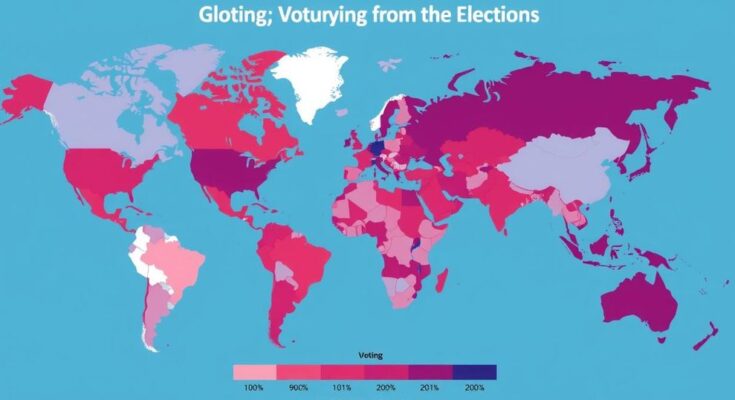In 2024, nearly half of the world’s population participated in elections across over 60 countries, marking a significant moment for democracy. The results, however, reflected a tendency for voters to prioritize immediate economic concerns over collective interests, leading to the downfall of many incumbents, including major leaders like President Biden and PM Modi. Despite the growth in democratic participation, challenges remain evident, especially around issues of populism and economic instability.
In 2024, democratic engagement surged as nearly half the world’s population participated in elections across more than 60 countries. This unprecedented collective action represents a significant milestone in global democracy. However, the outcomes yielded a mixed bag of results, reflecting continued tendencies of self-interest and tribalism among voters. Economic concerns overshadowed pressing issues such as climate change, leading many voters to prioritize immediate financial stability over long-term existential threats.
In nations like the United Kingdom, a focus on economic challenges aided the Labour Party’s substantial win over the Conservatives, while in the United States, President Joe Biden faced voter backlash despite efforts to curb inflation. This trend of voting with one’s wallet resulted in several incumbents being ousted, illustrating voters’ impatience with economic stagnation and dissatisfaction with their leaders’ ability to address immediate issues.
Compelling incidents highlighted the year’s electoral climate. For instance, Donald Trump’s return to prominence in the U.S. showcased a political revival that defied conventional expectations, especially in a landscape marked by significant global challenges. Meanwhile, elections in countries such as India, where Prime Minister Modi’s party faced reduced support, and South Africa, where the ruling party lost its majority, indicated a shift away from mainstream politics toward populist alternatives.
Amid these shifts, international incidents such as the political turmoil in Bangladesh and the contrast seen in Macron’s actions following Europe’s populist surge raised questions about the resilience of democratic institutions. In Russia, Vladimir Putin’s overwhelming electoral victory, coupled with repressive tactics against dissent, starkly illustrated a distorted manifestation of democracy.
While results varied from country to country, a common theme emerged: voters largely sought change in response to economic pressures. The ramifications of these choices may pose significant challenges for global democracy moving forward into 2025, particularly as seen through cultures grappling with the dualities of autocratic governance versus democratic aspirations. The ongoing impacts of economic distress, geopolitical instability, and the rise of populism compel a reflection on the future viability of democratic governance across all corners of the globe.
The year 2024 marked a historic milestone in democratic participation, with an unprecedented number of countries conducting elections involving nearly half of the world’s population. This phenomenon represents both an opportunity for collective growth and a challenge, revealing an ongoing struggle with self-interest and tribal mentality among voters. The effects of economic turmoil, climate crises, and geopolitical tensions have shaped the priorities and decisions made at the polls, thrusting immediate concerns to the forefront over longer-term solutions.
In summary, the global electoral landscape of 2024 has revealed significant insights into voter behavior, demonstrating a predominant focus on immediate economic needs over collective future concerns. As multiple incumbent leaders faced electoral defeats due to these pressing issues, the year underscored the volatility within democracies worldwide, particularly in the face of rising economic challenges and populist sentiments. Moving forward, it remains crucial for democratic institutions to adapt and respond to the evolving will of the electorate in order to sustain their legitimacy and effectiveness.
Original Source: edition.cnn.com




